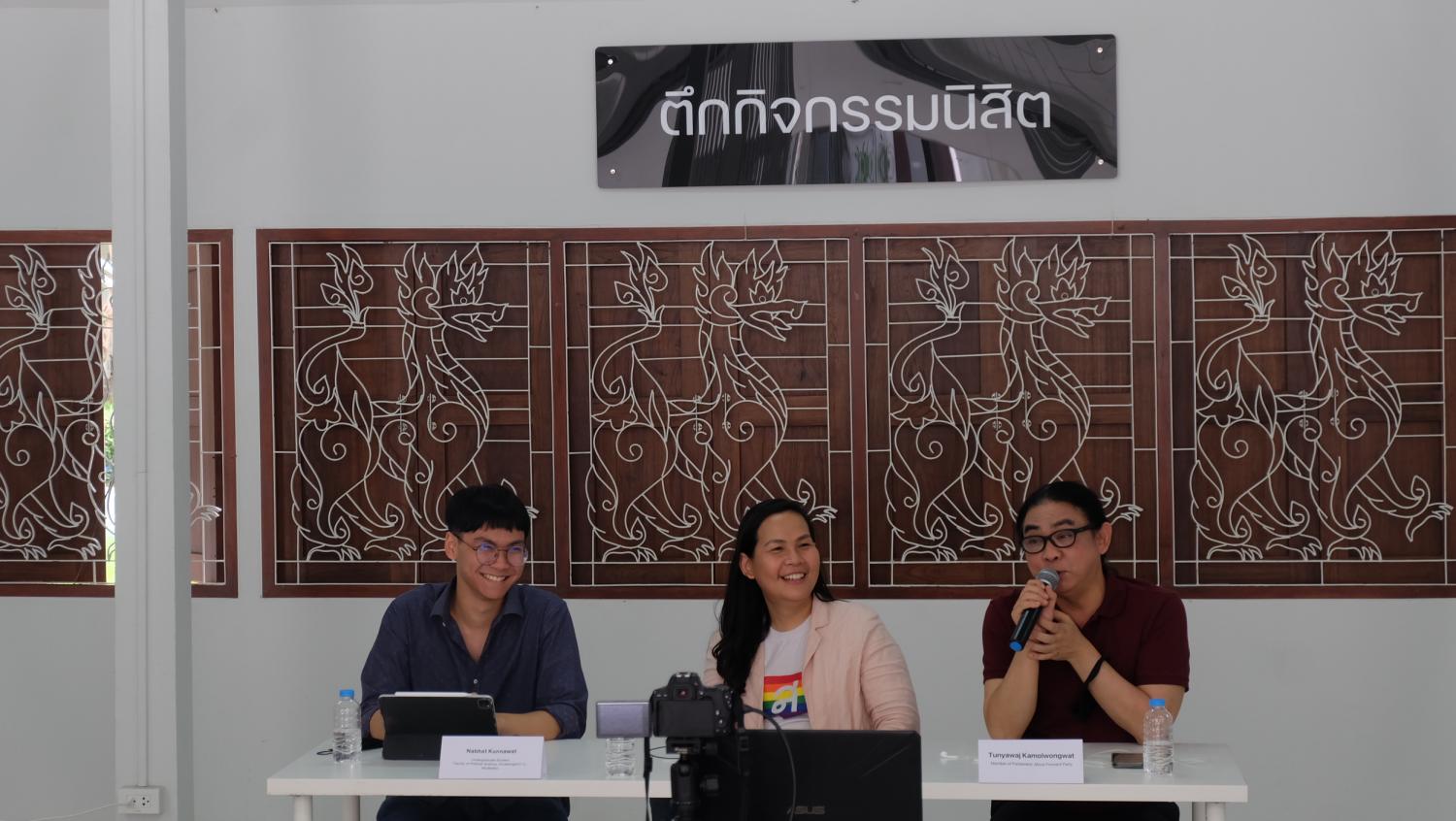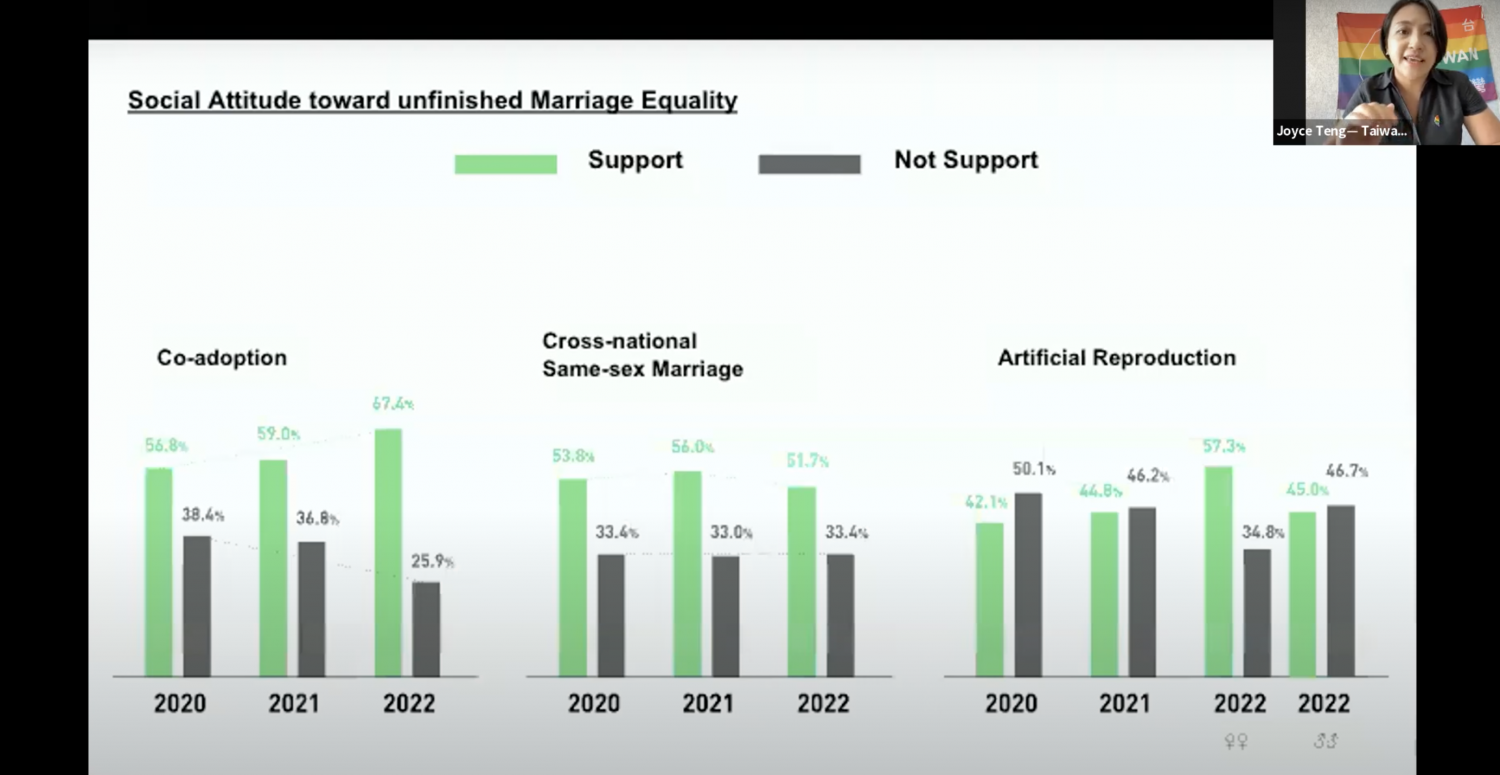Joyce Teng remembers the day when Taiwan's parliament passed the same-sex marriage bill in 2019, making it the first country in Asia to recognise such a union. Thousands of supporters erupted in joy outside the parliament building in the capital.
"It was raining in the morning, but eventually we saw the sunlight in the afternoon when the law was finally read and passed. We could see the rainbow in the sky. It was an amazing day," she said.
In 2017, the island's constitutional court ruled that same-sex couples had the right to marry, giving parliament two years to change the law, but some conservative opponents held referenda which saw a public backlash against same-sex marriage in late 2018, saying that the legal definition of marriage is the union of a man and a woman. But campaigners refused to give up and the government proposed a separate law for same-sex couples.
"Although the bill isn't completely equal, it provides most of the same legal rights for same-sex couples as heterosexual couples have," she told the forum titled "Marriage Equality In Thailand: An Experience From Taiwan". It was held recently to share ideas and best practices by Sam Yan Press, the Political Science Student Union of Chulalongkorn University, the Taiwan Foundation for Democracy and Chiron Taiwan.
"The movement was a long and sometimes difficult process," said Joyce, who is now the deputy executive director of the Taiwan Equality Campaign, a non-governmental organisation that advocates for LGBTI rights.

Joyce Teng, deputy executive director of the Taiwan Equality Campaign.
After martial law was lifted in 1987, an increase in LGBTI rights violations set off the movement. Since the turn of the century, activists have pushed for legal changes, for example, gender equity education and same-sex marriage. But it was the tragic death of French Prof Jacques Picoux in 2016 that inspired so much public sympathy that legislators worked together to legalise same-sex marriage. It was believed he committed suicide after the death of his Taiwanese partner of 35 years from cancer the year before. He was not allowed to make a medical decision in his partner's final moment and claim the house they shared.
Joyce said political engagement, democracy and gender education are key to legalising same-sex marriage. First, civil society and the youth movements in politics are very active. Second, public participation in the democratic process, such as elections at different levels, makes society more open, diverse and possible to accept new things. Lastly, the Gender Equity Education Act in 2004 enabled the next generation to understand the concept of gender equality.

Nada Chaiyajit. centre, and Tunyawaj Kamolwongwat, right, campaign for marriage equality at Chulalongkorn University's Faculty of Political Science.
Despite the legalisation of same-sex marriage, Joyce said it remains "unfinished" because the current law does not allow co-adoption, cross-national same-sex marriage or artificial reproduction. Yet, annual surveys show that public support for these issues has improved, especially co-adoption rights. It has grown from 59% (2021) to 67.4% (2022). "It is a sign that we think people will support full marriage equality in the future," she said.
In Thailand, campaigners have similarly fought an uphill battle for marriage equality. In 2012, a same-sex couple was denied the right to register marriage because the Civil and Commercial Code does not recognise same-sex union. But the military coup in 2014, led by Gen Prayut Chan-o-cha, stalled the civil partnership proposal. After the process resumed, the cabinet approved the government-sponsored draft bill in July 2020, but it underwent further review.
Meanwhile, the opposition Move Forward Party has sought an amendment to the Civil and Commercial Code. After parliament received the draft bill in June 2020, it remained in queue for deliberation for some time until lawmakers in the House of Representatives voted in favour of it in February, but it would remain under review for 60 days. Finally, parliament passed the marriage equality draft bill and three others, including government-sponsored civil partnership, in the middle of June.
Move Forward Party MP Tunyawaj Kamolwongwat, who proposed a progressive version of the bill, unveiled the timeline for procedures. He said an ad hoc committee will finish revising drafts at the end of this month and submit them to parliament for the second and the third readings at the end of this year. Then, they will be sent to the Senate. "By the middle of next year, we will know whether marriage equality will happen or not," he said.

Annual surveys that show growing support for marriage equality in Taiwan.
According to the Secretariat of the House of Representatives, Chanan Yodhong, the spokesperson for an ad hoc committee, said four drafts are being revised in a parallel manner and will be submitted together before the end of the parliamentary session on Sept 18. Activists last week submitted a petition calling for the committee to speed up the process and expressed concern that some of them threatened to vote down the same-sex marriage draft due to homophobia.
The fight for marriage equality has faced opposition from some religious and legal institutions. An MP from the Prachachart Party told a House meeting in February that he rejects the draft bill on behalf of other Muslims for flouting their belief which assigns the definition of husband and wife to man and woman. An expert from the Sheikhul Islam Office expressed concern that if the bill passed into law, young followers would disown their tenets and marry those of the same sex.
Last November, the Constitutional Court delivered a landmark ruling on Section 1448 of the Civil and Commercial Code, which allows only a heterosexual couple to tie the knot, after a same-sex couple denied the right to marry in 2020 filed a complaint. A 12-page document said it is not unconstitutional because, by tradition, marriage is the union of a man and a woman for reproduction. A separate law should be enacted for LGBTI people.
Nada Chaiyajit, a human rights campaign adviser for the Manushya Foundation and member of the Thai Sang Thai Party, said intersex (a person born with diverse sex characteristics) people have struggled in a heteronormative society. For example, they have faced medical intervention and a lack of information on sexual pleasure for well-being. Also, they do not have the freedom to remain intersex or choose their own identity.
"When it comes to marriage equality, it is like an ideal because we need a lot more information in terms of empowerment. Whether marriage equality or civil partnership, they are trying to include us as key actors, but in our experience, it isn't deep enough. For example, who enjoys the right to sign a marriage certificate? Don't talk about surrogacy when we are struggling because the medical system isn't even ready to welcome us," she said.

